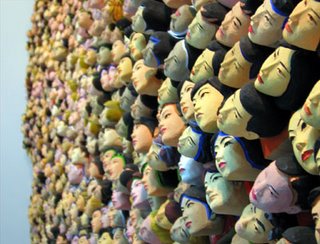The Korean Way (6): brother, lover...
 A Korean friend of ours caused consternation at a weekend party recently, when we started to ask her what she used to call her long-time fiancé. The answer? "Older brother". Turns out, Korean language, with all its different ways of addressing people, does not have words for "darling" or "honey" or other niceties that people tend to whisper when one-on-one in comfortable surroundings.
A Korean friend of ours caused consternation at a weekend party recently, when we started to ask her what she used to call her long-time fiancé. The answer? "Older brother". Turns out, Korean language, with all its different ways of addressing people, does not have words for "darling" or "honey" or other niceties that people tend to whisper when one-on-one in comfortable surroundings.Indeed, how to address Koreans outside of ones immediate family is the cause of much trouble. Two other guests at the same party spent the first five minutes interrogating our friend about her age, where she worked etc. It is not uncommon to be exposed to quite intense questioning the first time you meet a Korean, and they don't shy away from asking details about how big your apartment is and how much money you earn.
The reason for this is only one: they want to know how they should address you. Speaking in a less polite manner than your standing in society entitles can cause major loss of face for the errant person. In fact there are two very different sets of Korean language: formal speak and everyday Korean.
Now, for the Korean-bashers: to use language to denote different social strata is not a Korean invention. Every language and society has this, to some extent. In Europe the French excel in it, and Britain as well (though the simple word "you" is a blessing for everyone learning English). Holland and the Nordic countries are increasingly lax in titles and habits. One speciality of Sweden is phone-culture: you can reach virtually anybody in Sweden on their phone, and they will pick up and answer themselves. Try that in France, and you will be met by a secretary hissing "And you are calling on behalf of whom?"
Technology fosters new habits and shifts in everyday culture. E-mail and mobile phones affect language, and the use of it, more than anything else right now. The outcome will be a more effective, less formal way of communicating (this is already happening).
Now, if someone could invent a Korean word for "darling"...

1 Comments:
In Japanese movies you see the wife address the husband as "anata" (you) and the subtitle says "darling", recognising that this is can indeed be an intimate mode of address for Japanese people! Once a couple has children, parents call each other "mummy" and "daddy" and not just in front of the children.
Koreans must find it very strange to be addressed as "darling" or "sweetheart" by newspaper vendors in London!
Post a Comment
<< Home